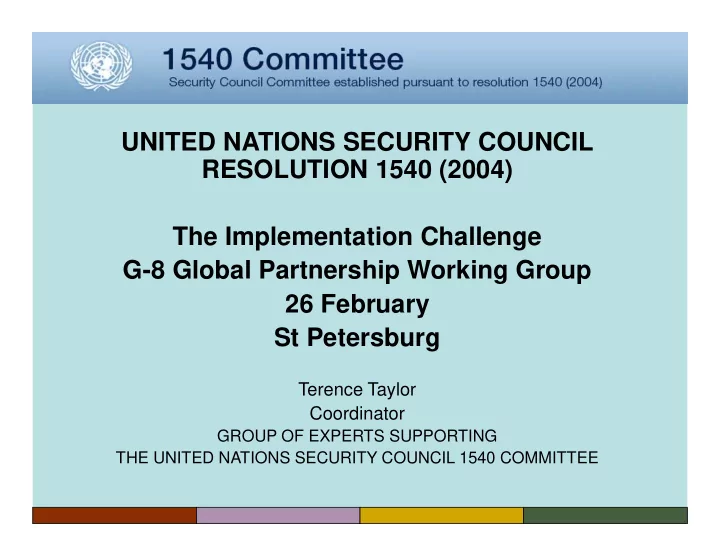

UNITED NATIONS SECURITY COUNCIL RESOLUTION 1540 (2004) The Implementation Challenge G-8 Global Partnership Working Group 26 February St Petersburg Terence Taylor Coordinator GROUP OF EXPERTS SUPPORTING THE UNITED NATIONS SECURITY COUNCIL 1540 COMMITTEE
UN SECURITY COUNCIL RESOLUTION 1540 (2004) • Unanimously adopted on 28 April 2004 under Chapter VII of the UN Charter, and reaffirmed by four follow-up resolutions (1673 (2006), 1810 (2008), 1977 (2011) and 2055 (2012)). • Proliferation of nuclear, chemical and biological weapons, as well as their means of delivery, constitutes a threat to international peace and security. • Legally binding instrument countering the threat posed by non-state actors , including terrorists, of acquiring such weapons or related materials. • Complements relevant multilateral treaties and arrangements.
UN SECURITY COUNCIL RESOLUTION 1540 (2004) • Basic obligations – Refrain from providing any form of support to non-state actors that attempt to develop, acquire, manufacture, posses, transport, transfer or use WMD & their means of delivery – Adopt and enforce appropriate and effective laws that prohibit any non-state actor engaging in such activities, including acting as an accomplice, or to assist or to finance – Establish domestic controls to prevent the proliferation of these weapons, i.e. controls over related materials, measures in the areas of accounting / securing, physical protection, border and law enforcement , export and trade-related controls. The resolution specifies the obligations – that is what States • have to do, but not how to do it
Resolution 1977 (2011) Extension of the Mandate of the1540 Committee to 2021
WHAT IS THE 1540 COMMITTEE? • Subsidiary body of the Security Council, composed of the fifteen current members of the Council, assisted in its work by a group of nine experts; • Current Chair: Ambassador Oh Joon, Republic of Korea; • Not a Sanctions Committee. Does not investigate or prosecute alleged violations of non-proliferation obligations; • Mandate and scope of activities of the 1540 Committee are derived from UNSCR 1540 and its follow-up resolutions; Four Committee Working Groups , covering the four • key areas of work: (I) Monitoring and National Implementation ; (II) Assistance ; (III) Cooperation with International Organisations ; (IV) Transparency and Media Outreach.
Key 1540 Committee Documents • Programme of Work (endorsed by the Security Council) • Annual Review (latest 2013 N.B. Future Steps)
1540 IMPLEMENTATION National Report Sharing of The 1540 experiences Matrix Dialogue with National Action Plan States
VOLUNTARY NATIONAL REPORTING List of UN Member States • States are called upon to submit a yet to submit a first report report on the implementation of the as of 1 February 2014 resolution 1. Cape Verde 2. Central African Republic • States that have submitted such 3. Chad 4. Comoros reports are encouraged to provide 5. DPRK additional information, including, 6. Equatorial Guinea 7. Gambia voluntarily, on effective practices 8. Guinea 9. Guinea-Bissau 10. Haiti • Continuous task 11. Lesotho 12. Malawi 13. Mali • All but 22 UN Member States have 14. Mauritania 15. Mozambique submitted at least a first national 16. Sao Tome and Principe 17. Solomon Islands report 18. Somalia 19. Swaziland 20. Timor-Leste • Objective: universal reporting: 10 th 21. Zambia anniversary in 2014 22. Zimbabwe
NATIONAL IMPLEMENTATION ACTION PLANS • States are encouraged to prepare, on a voluntary basis, National Implementation Action Plans (NAP) mapping out their priorities and plans for implementing UNSCR 1540 • NAP has to fit national circumstances: scope, content and form vary • Valuable to enhance inter-agency coordination for, inter alia, gap analysis, prioritisation, identification of assistance needs • Relationship to Integrated National Nuclear Security Plan (INNSP)
VISITS TO STATES • The 1540 Committee actively engages with States, including through visits to States, at their invitation. • Planned by inviting State in coordination with the 1540 Committee: Visits can be used to discuss any matter related to the implementation of UNSCR 1540, such as national implementation efforts, assistance needs, first report / additional information, national action plans, effective practices etc. • Visits to Albania, Burkina Faso, Grenada, Madagascar, Niger, Republic of Congo, Republic of Korea, Trinidad and Tobago and U.S.A: more are in the pipeline.
Cooperation with International Organisations (1) • International Atomic Energy Agency (IAEA), INTERPOL. Office International des Epizooties (OIE) Organisation for the Prohibition of Chemical Weapons (OPCW), World Customs Organisation (WCO), World Health Organisation (WHO) OPCW ORGANISATION FOR THE PROHIBITION OF CHEMICAL WEAPONS
Cooperation with International Organisations (2) Regional Organisations (Illustrative list only) – African Union (AU) – ASEAN Regional Forum (ARF) – Central American Integration System (SICA) – Collective Security Treaty Organisation (CSTO) – Commonwealth of Independent States (CIS) – European Union (EU) – Caribbean Community (CARICOM) – Organisation of American States (OAS) – Organisation for Security and Cooperation in Europe (OSCE) – Pacific Islands Forum (PIF) – Shanghai Cooperation Organisation (SCO)
Transparency and Outreach • Academia • Outreach to Industry • Parliamentarians • Public events • Publications (1540 Compass) • Web Site (www.un.org/sc/1540)
Relationship with other Committees/Panels • Counter-terrorism – 1267 (1999) Al Qaida/Taliban – 1373 (2001) Counter-Terrorism Committee (CTC) • Sanctions – 1718 (2006) DPRK – 1737 (2006) Iran
Funding Challenge • 1540 Implementation is under-funded • Cuts in UN Budget for 2014 • Importance of Donations to the UN Trust Fund – Role of UN ODA • Other Direct Financial Support • Support from other UN Bodies such as INTERPOL and UNODC
UN SECURITY COUNCIL RESOLUTION 2118 (2013) SYRIAN CHEMICAL WEAPONS
CONTACT DETAILS Chair of the 1540 Committee Attention: Chair, 1540 Committee: H.E. Ambassador Oh, Joon, Permanent Representative of The Republic of Korea to the United Nations 730 Third Avenue, TB-08040E, United Nations, New York, NY 10017 Fax: +1 (212) 963-1300, Email: sc-1540-Committee@un.org 1540 Committee Group of Experts 300 East, 42nd Street, Third Floor, New York, NY 10017 Fax:+1 (917) 367 9358, Email: 1540experts@un.org 1540 Committee Website: www.un.org/sc/1540
Recommend
More recommend